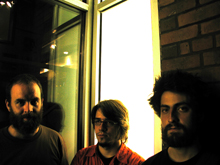I Have Eaten the City
By wavelength ~ Posted Tuesday, January 30th 2007
Sunday, February 11 10pm @ sneaky dee’s
Purveyors of: “First we take Manhattan, then we take Berlin”
I Have Eaten The City improvise all of their music, using jazz/rock‘n’roll instruments, synths, found sound objects, and a laptop for live manipulation. In the process they create synthetic, futuristic jazz, and give the indie/psych scene some of its most abstract and mind-expanding music. Its imagery and atmospheres are rich and really open to interpretation; Demian interviewed the band and imagines urban darkness and a strange energy, spreading through the streets, swelling and swallowing up people and cars and culture and architecture. Something spectral but not evil, like something from Ghost Busters. Or a giant child. Naturally, you will have your own references, and they will be equally right, and much more wrong.
How do you approach and how do you conceptualize your music?
Nick Storring (cello, electronics): I feel that the diversity of our interests, along with the fact that we all compose causes us to treat improvisation in a composerly way. It permits a great deal of freedom to explore, but also gives an actual cohesive band “sound” to a certain extent.
Colin Fisher (guitar, tenor sax): My own personal approach to music varies quite a great deal depending on the context. In relation to IHETC, all the music we make is improvised, but it draws on a varied palette of musical idioms because of our eclectic interests and training/experience.
Brandon Valdivia (drums, percussion): One of the major joys I derive from the music we make together is in how diverse it can be. Every time we get together the potential is so varied it’s a huge surprise what turns out. We aren’t shunning any style when we play together, anything and everything is a possibility.
How does the improvisation happen? How do you incorporate and navigate between intention and accident, impulse and error and chance and control?
Colin: All avenues mentioned above are fair game for us. I embrace as much impulse as I do restraint, error to me is an opportunity to take the music somewhere else... we’ve composed certain ideas to develop in real time situations and I find it just as interesting as pure improv as long as the form seeks to eliminate hesitation rather than fetter the flow of instant composition.
Nick: It’s about strategically balancing, through listening, responding, and composing, all of the aforementioned elements, and coming to terms with the potential for all of them to emerge within the span of a given piece, in some form.
Are you avant-garde? Are you modernist? Are you postmodern?
Nick: I think we’re certainly pretty far removed from the notions of modernism or vanguardism. We’re not trying to be “cutting edge”... we’re exploring and enjoying in a very pluralistic sense. We are complete music gluttons who actively delve into any category... so those facts align us more with the postmodern I suppose.
Are you very involved in the Association of Improvising Musicians of Toronto? It’s interesting how music spreads and connects, and along the way creates social networks.
Colin: AIMT is part of a larger community of musicians in Toronto. We embrace it and are all individually involved with various members within the improvised music community in Toronto. However as individuals we’re also aligned with the noise community, indie rock, different world music communities, electronic (IDM, glitch, etc) and so on.
Nick: I think we’re beginning to a see proliferation of cross-pollination between seemingly disparate musical worlds within Toronto. There are a lot of musicians like the three of us who play in numerous projects of varying approaches, degrees of recognition, and degrees of accessibility. It’s great. Audiences seem to reflect this diversity as well.
Any thoughts on future plans and potentials, having eaten the city?
Colin: We’re looking at establishing ourselves on a more national and international level, playing music festivals, collaborating with various artists (one successful mention would be with Barnyard Drama at last year’s Bummer in the Summer festival), and we’ve also been experimenting with composition. As for eating the city...
Wavelength is seven years old and our scene seems to be in good health. Any thoughts on our indie scene’s past/present/future?
Brandon: From what I can tell things seem really healthy. Lots of interesting things going on, lots of positivity... the scene feels very active. Congratulations, Wavelength.
By Demian Carynnyk
